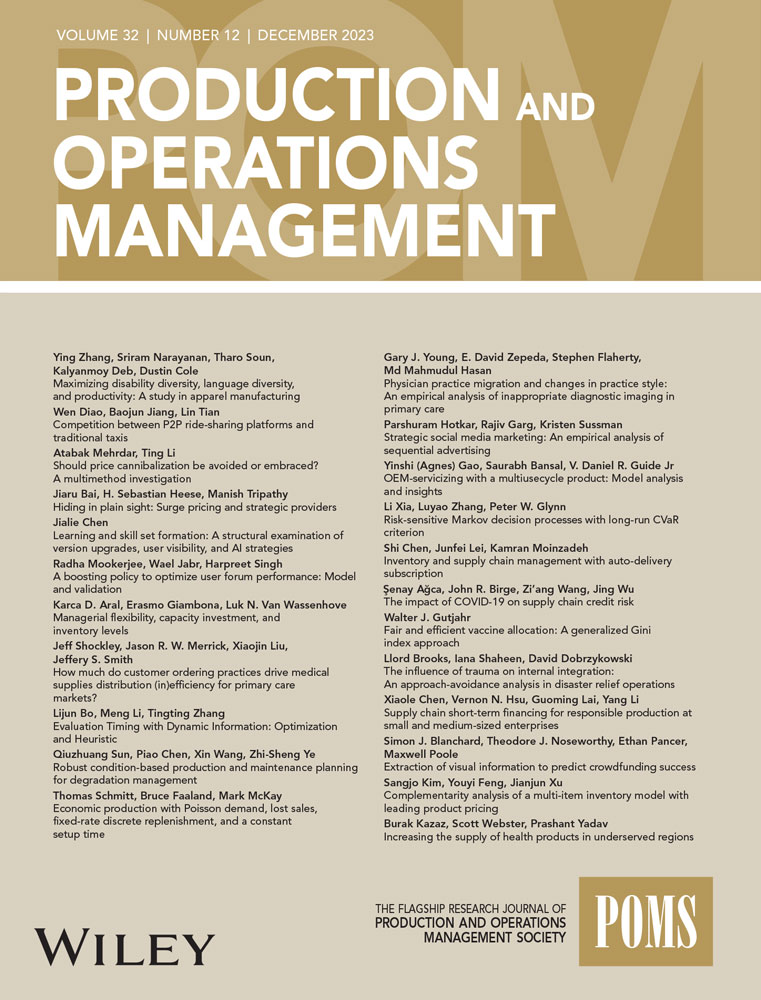EXPRESS: Cost Optimization in Cloud Computing: Capacity Reservation for Intermittent Random Demand Surges
IF 4.8
3区 管理学
Q1 ENGINEERING, MANUFACTURING
引用次数: 0
Abstract
The adoption of cloud computing has been accelerating over the last decade, while enterprise cloud users (“firms”) are struggling to manage their growing cloud expenditures in the face of intermittent digital demand surges caused by planned or random events. To deal with such challenges, a firm can employ reserved instances with the standard contract length (e.g., one year) to meet the stationary base demand, which we refer to as the base contracts, complemented by additional reserved instances with either standard or shorter contract lengths, which we refer to as the supplementary contracts, to cope with the demand surges. We first analyze a model whereby the surge and inter-surge durations are deterministic, demand magnitude is random, and cancellation of the reservations is allowed. We develop a capacity management plan for the firm including not only the optimal capacity levels, which follow a newsvendor-type solution, but also the optimal policy for managing the purchase, renewal, cancellation, or expiration of the supplementary contracts, which can be characterized as a two-threshold policy. Due to the complexity of the structure of the optimal policy, we also construct an effective heuristic policy by excluding the renewal option from the action space, which can be applied to a more general setting where the surge and inter-surge durations are random. We examine two model extensions: (1) when trades of reserved instances are allowed in a secondary marketplace; (2) when the firm does not have exact information about the distributions of the surge magnitude and duration while it can adjust the capacity levels as data unveils. Our analysis shows that the optimal policy for managing the supplementary contracts depends on the relative magnitude of the surge and inter-surge durations in relationship to the cancellation fee. Moreover, our numerical results show that cloud platforms that offer a secondary marketplace are more attractive to firms from a cost standpoint than those that allow cancellation only. The latter, without the secondary marketplace, however, can achieve parity with the former by offering a deeper discount rate for the reserved instances, thereby bypassing the cost of administering the secondary marketplace.快讯:云计算中的成本优化:间歇性随机需求激增的容量预留
云计算的应用在过去十年中不断加速,而企业云用户("公司")却在计划或随机事件导致的间歇性数字需求激增面前,努力管理其不断增长的云支出。为了应对这种挑战,企业可以采用标准合同长度(如一年)的预留实例来满足固定的基本需求,我们称之为基本合同,并辅以标准或较短合同长度的额外预留实例(我们称之为补充合同)来应对需求激增。我们首先分析了一个模型,在这个模型中,激增和激增间的持续时间是确定的,需求量是随机的,并且允许取消预订。我们为该公司制定了一个产能管理计划,其中不仅包括遵循新闻供应商类型解决方案的最优产能水平,还包括管理补充合同的购买、续订、取消或到期的最优政策,该政策可表征为双阈值政策。由于最优政策结构的复杂性,我们还构建了一个有效的启发式政策,将续约选项排除在行动空间之外,该政策可应用于激增和激增间隔时间为随机的更一般环境。我们研究了两个模型扩展:(1)允许在二级市场上对保留实例进行交易;(2)企业不掌握有关激增幅度和持续时间分布的确切信息,但可以根据数据调整产能水平。我们的分析表明,管理补充合同的最优策略取决于激增的相对幅度和激增间持续时间与取消费用的关系。此外,我们的数值结果表明,从成本角度来看,提供二级市场的云平台比只允许取消合同的云平台对企业更有吸引力。然而,不提供二级市场的云平台可以通过为保留实例提供更高的折扣率,从而绕过管理二级市场的成本,达到与前者持平的效果。
本文章由计算机程序翻译,如有差异,请以英文原文为准。
求助全文
约1分钟内获得全文
求助全文
来源期刊

Production and Operations Management
管理科学-工程:制造
CiteScore
7.50
自引率
16.00%
发文量
278
审稿时长
24 months
期刊介绍:
The mission of Production and Operations Management is to serve as the flagship research journal in operations management in manufacturing and services. The journal publishes scientific research into the problems, interest, and concerns of managers who manage product and process design, operations, and supply chains. It covers all topics in product and process design, operations, and supply chain management and welcomes papers using any research paradigm.
 求助内容:
求助内容: 应助结果提醒方式:
应助结果提醒方式:


